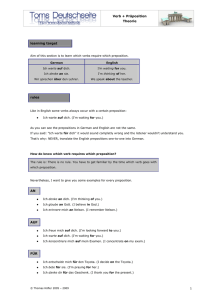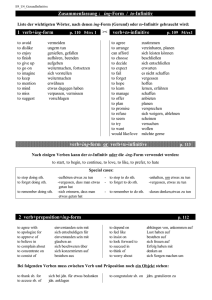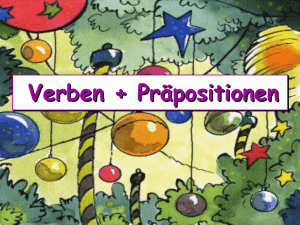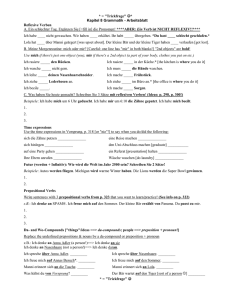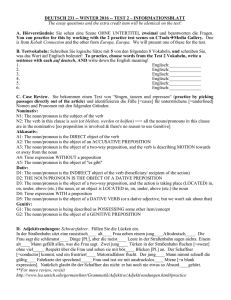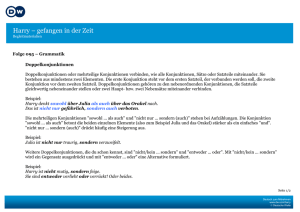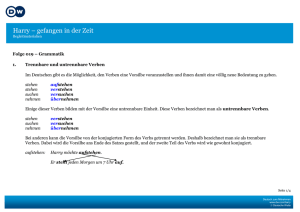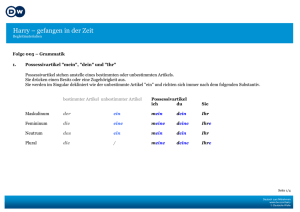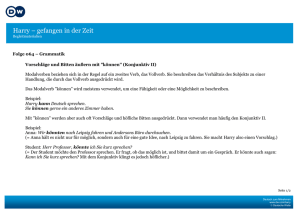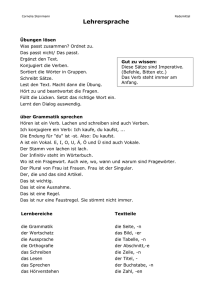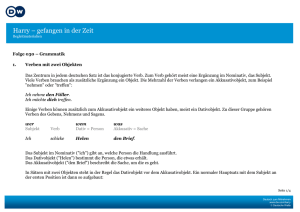Harry – gefangen in der Zeit - deutsch lernen | dw.com
Werbung
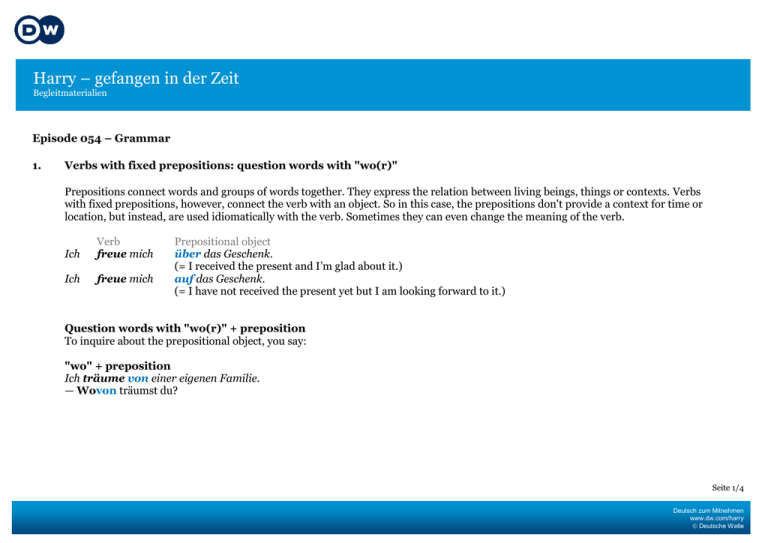
Harry – gefangen in der Zeit Begleitmaterialien Episode 054 – Grammar 1. Verbs with fixed prepositions: question words with "wo(r)" Prepositions connect words and groups of words together. They express the relation between living beings, things or contexts. Verbs with fixed prepositions, however, connect the verb with an object. So in this case, the prepositions don't provide a context for time or location, but instead, are used idiomatically with the verb. Sometimes they can even change the meaning of the verb. Ich Verb freue mich Ich freue mich Prepositional object über das Geschenk. (= I received the present and I’m glad about it.) auf das Geschenk. (= I have not received the present yet but I am looking forward to it.) Question words with "wo(r)" + preposition To inquire about the prepositional object, you say: "wo" + preposition Ich träume von einer eigenen Familie. — Wovon träumst du? Seite 1/4 Deutsch zum Mitnehmen www.dw.com/harry Deutsche Welle Harry – gefangen in der Zeit Begleitmaterialien If the preposition begins with a vowel: "wo + r" + preposition Erinnerst du dich an unseren ersten Kuss? — Woran soll ich mich erinnern? Ich muss über etwas sprechen. — Worüber möchtest du sprechen? More: When asking about living beings, you use the preposition + "wen" or "wem". The preposition determines the case of the question word. Examples: Ich träume von Julia — Von wem träumst du? Erinnerst du dich an Nick? — An wen soll ich mich erinnern? Ich muss über den Pinguin sprechen. — Über wen möchtest du sprechen? Seite 2/4 Deutsch zum Mitnehmen www.dw.com/harry Deutsche Welle Harry – gefangen in der Zeit Begleitmaterialien 2. Verbs with fixed prepositions: prepositional adverbs with "da(r)" Prepositions connect words and groups of words together. They express the relation between living beings, things or contexts. Verbs with fixed prepositions, however, connect the verb with an object. So in this case, the prepositions don't provide a context for time or location but instead are used idiomatically with the verb. Sometimes they can even change the meaning of the verb. Adverbs with "da(r)" + preposition The object connected to a verb by a fixed preposition can be replaced by certain adverbs known as prepositional adverbs. "da" + preposition or "dar" + preposition (when the preposition begins with a vowel) can be used when: ... the object or context was just mentioned and is therefore known. Example: Ich träume von einer eigenen Familie, Kinder, Haus, Hund! Davon träume ich, Harry! (= Julia has already told Harry about her dreams. That's why she can sum it all up in her second sentence.) ... when the object or context is explained immediately afterward. Example: Ich denke über etwas nach. — Worüber denkst du nach? Ich denke darüber nach, dass ich mit Julia sprechen muss. Seite 3/4 Deutsch zum Mitnehmen www.dw.com/harry Deutsche Welle Harry – gefangen in der Zeit Begleitmaterialien More: "da(r)" + preposition can only be used for things, facts or circumstances. For living beings you have to use personal pronouns. Example: Ich träume von Julia – Ich träume von ihr. Ich denke über Julia nach. – Ich denke über sie nach. Seite 4/4 Deutsch zum Mitnehmen www.dw.com/harry Deutsche Welle
